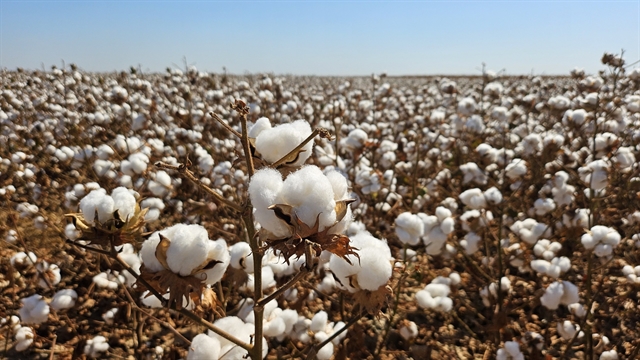 |
| A cotton field of Mano Júlio Farm in Ipiranga do Norte, Mato Grosso. — VNS Photo Ly Ly Cao |
Ly Ly Cao
MATO GROSSO — Brazilian farmers are shaking things up, opting for a more sustainable approach to agribusiness.
Brazil reigns as the world’s top exporter of numerous agricultural commodities and a pivotal player in the global value chain, supplying enough food to feed over 1.9 billion people annually.
For the first half of 2024, the official data revealed a staggering US$82.39 billion in Brazilian agribusiness exports, marking the second-highest total on record.
However, this booming sector also carries a hefty environmental burden, contributing directly to 20 per cent of Brazil’s greenhouse gas emissions, a study by Boston Consulting Group showed.
Additionally, certain sectors within the agricultural chain have a historical track record of fuelling deforestation, responsible for a whopping 50 per cent of the country’s overall emissions.
Given increasingly stringent ESG framework regulations from domestic authorities and international importers, notably in the European Union, one of Brazil’s key markets, it is an inevitable shift to seek effective solutions for reducing carbon emissions and promoting sustainable practices.
Việt Nam News reporter journeyed to Mato Grosso, the country’s agricultural giant state, to witness notable advancements in Brazilian agricultural activities.
After the boom of corn ethanol production in Brazil starting in 2017, corn ethanol and protein-rich livestock feed derived from the ethanol production process byproducts (DDGs) are seeing rising demands.
This presents huge opportunities for local producers, with evident transformations unfolding prominently in Mato Grosso through the establishment of an integrated food and energy production system.
Applying a closed production cycle, FS Fueling Sustainability delivers its commitment to enhance sustainability practices in agribusiness.
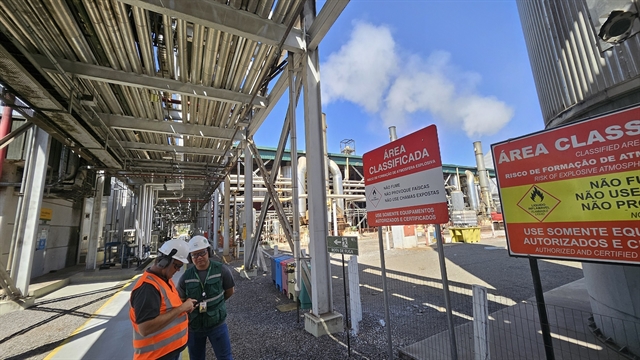 |
| Workers at the biorefinery plant of FS. — VNS Photo Ly Ly Cao |
The first corn ethanol plant in Brazil effectively managed all industrial liquid emissions, ensuring that only environmentally friendly effluents were released.
Its clients are from diverse industries, such as biofuel distributors, livestock farmers, feed manufacturers in the animal nutrition sector, and cleaning producers. However, all of its suppliers and customers must fulfil the company’s requirements in terms of social-environmental management.
In 2022/23, FS maintains its A1 rating as well as a score of 62 in Moody’s sustainability rating.
ALD Bioenergia, which was founded by a group of 24 farmers in Nova Marilândia in 2019, also embodies a distinct vision for the sustained expansion of local producers.
It is a biorefinery that converts local corn into more valuable products, especially ethanol.
The plant produces nearly 113 million litres of corn ethanol for the fuel market, while offering high-protein animal feed.
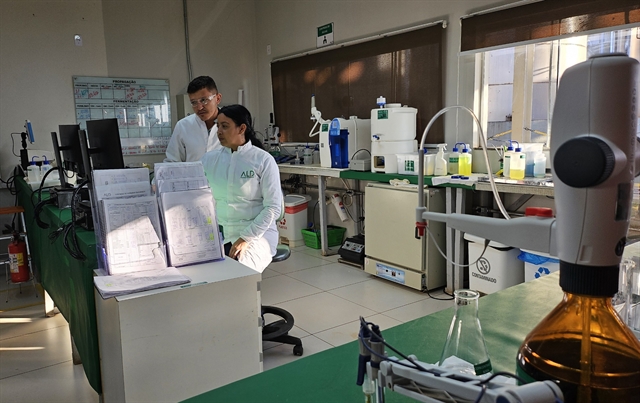 |
| Researchers work in the lab of ALD Bio. — VNS Photo Ly Ly Cao |
It also contributes a lower amount of carbon emissions to the environment and creates jobs for the local workforce.
Macro Orozimbo F. Rosas, CEO of ALD Bioenergia, said that the union’s system is seen as a blueprint for a more sustainable future, despite the current lack of profitability.
Nonetheless, the CEO anticipates expanding the refinery and foresees their products – corn ethanol and DDGs – entering the global market within three years.
The union now boasts 42 associated members.
This year, ALD Bio plans to produce 145,000 m3 of ethanol and 82,000 tonnes of DDGs. The figures reflect a 34.3 per cent and 28.1 per cent increase year-on-year, respectively.
It also forecasts issuing 138,000 decarbonisation credits (CBIO) in 2024, nearly double that of the previous year.
At a São Paulo Farm, a member of ALD Bioenergia, the processes of planting grains, conducting research, managing irrigation systems and drying operations all follow the refinery’s environmental guidelines.
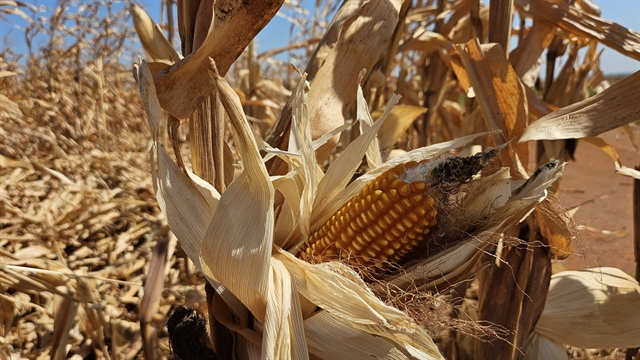 |
| The corn crop is ready for harvesting in the field of this São Paulo farm. — VNS Photo Ly Ly Cao |
By doing double-cropping, thanks to the unique climate of Mato Grosso, the São Paulo Farm and others are able to maximise yields, while minimising the environmental impacts.
It also leverages biomass for generating electricity and allocates a portion of its land to cultivate trees like eucalyptus for fuel, effectively sidestepping deforestation practices.
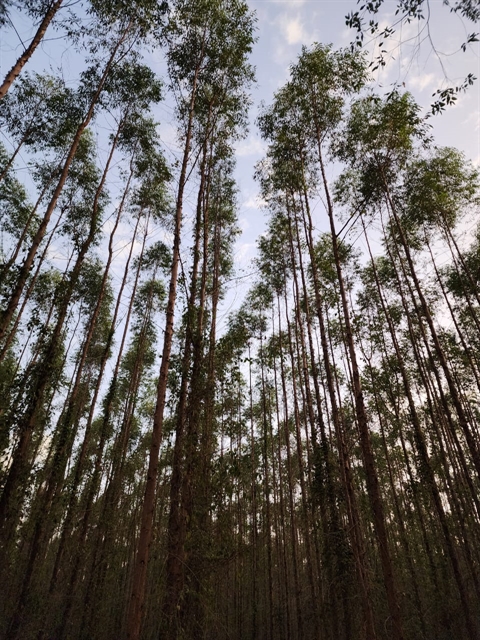 |
| Eucalyptus trees for biomass. — VNS Photo Ly Ly Cao |
In Ipiranga do Norte, another municipality in the state of Mato Grosso, Mano Júlio Farm operates with a straightforward primary objective: sustainable growth and energy efficiency.
Here, waste from one process can be input for others, such as cottonseed, which can be used for biomass or mixed with other ingredients, including DDGs, to make animal feed, while deceased animals are used for composting.
The farm even invests in its own laboratory to research fungi for the biological control of insect pests.
 |
| Fungi researched in the lab of Mano Júlio Farm are used to control white flies and other bugs. — VNS Photo Ly Ly Cao |
The use of fungi may depend on the weather conditions, but the aim is to reduce the use of chemicals on crops and cut costs.
Mano Júlio Farm also raises pigs and cattle, with around 36,000 pigs and 10,000 cattle.
To deal with the pig farm’s waste, which is harmful to the environment, it has built an over US$1.4 billion biogas-powered unit. Waste will fuel the electricity unit, which in turn powers the pig farms.
“We produce biogas from the pig farm’s waste, then burn this biogas to produce electricity,” Paulo Pupio Mano Julio, energy supervisor at Mano Júlio farm, told Việt Nam News.
“With around two to three generators, we can already meet the energy needs of the confinement during business hours, from 6am to 6pm, from Monday to Friday.”
Some of the farm’s livestock will be allocated for the domestic market, while the remainder is designated for export.
Guilherme Nolasco, CEO of the National Corn Ethanol Union (UNEM), highlights the enormous efforts of local producers in boosting the new production pathway and believes it will help produce more food and energy with fewer natural resources.
Clearly, the engagement of all stakeholders, spanning government officials, partners, producers, and farmers, alongside innovative technologies, stands out as essential components in driving sustainable progress within the agricultural sector. — VNS
Việt Nam, where agriculture serves as the cornerstone of the economy, is also taking steps to boost sustainable growth in agribusiness. As per the Ministry of Agriculture and Rural Development, organic farming in Việt Nam has surged from 53,350 hectares in 2016 to around 237,693 hectares in 2019. Forty-six out of 63 provinces and cities are advancing the organic production movement, involving 17,168 farmers. The sector comprises 97 organic enterprises, with 60 engaged in exports, generating approximately $335 million.However, challenges remain. Many small-scale cooperatives struggle to implement advanced, clean technologies and access credit support for green transitions due to limited capital and narrow operational scopes.Weak internal linkages within these cooperatives and limited collaborative efforts with other economic entities hinder the flexibility needed to transition to green agricultural cooperative models.
- Reduce Hair Loss with PURA D’OR Gold Label Shampoo
- Castor Oil Has Made a “Huge” Difference With Hair and Brow Growth
- Excessive hair loss in men: Signs of illness that cannot be subjective
- Dịch Vụ SEO Website ở Los Angeles, CA: đưa trang web doanh nghiệp bạn lên top Google
- Nails Salon Sierra Madre
 VnExpress News The News Gateway of Vietnam
VnExpress News The News Gateway of Vietnam




